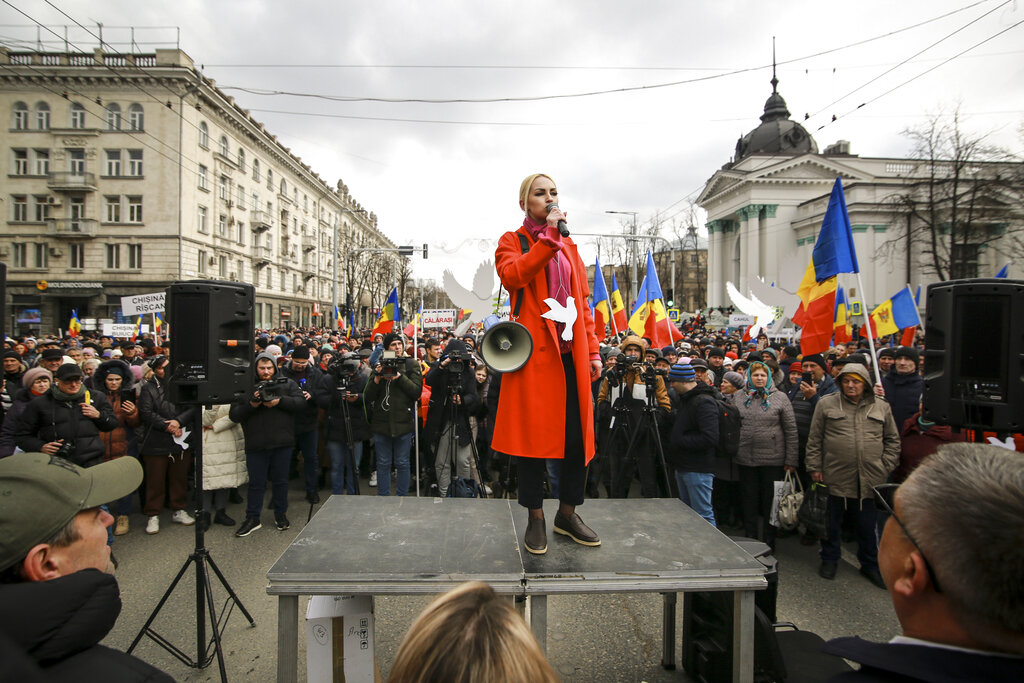Moldovans, Endorsing Tilt Toward Europe, Fend Off Moscow’s Electoral Dirty Tricks — but Just Barely
The Kremlin is targeting the pro-Western government of Moldova as part of a larger strategy to encircle Ukraine.

For Moldova, Moscow pulled out all the tricks in its hybrid warfare book — and came within a hair of winning. Yesterday’s final tally for Sunday’s referendum put the pro-Europe vote at 50.4 percent and the pro-Russia vote 49.6 percent.
As recently as two weeks ago, polls indicated that 63 percent of Moldovans would vote for enshrining in their constitution a national goal of joining the European Union. The shock drop in the pro-European vote was attributed to the effectiveness of a $100 million dirty tricks campaign directed from Moscow. This Saturday, a similar election influence campaign may influence elections in Georgia, another runaway former Soviet republic.
Normally, the Kremlin might not care about elections in Moldova, a landlocked farming country that rivals Ukraine as the poorest country in Europe. This time, the Kremlin targeted the pro-Western government of Moldova as part of a larger strategy to encircle Ukraine.
In the south, Ukraine has a 760-mile long border with Moldova. In the north, Ukraine has a 640-mile border with Belarus, now a satellite state of Russia. To the east, Ukraine has a 1,426-mile border with Russia.

Yesterday, official Moscow expressed bitter disappointment over the cliffhanger election defeat. In the vote, Moldova’s Harvard-trained president, Maia Sandu, won 42.5 percent of the vote. This places her in the lead position for a November 3 runoff against Russian-friendly candidate Alexandr Stoianoglo.
“What we see is a mechanically hard-to-explain rate of increase in votes in favor of Sandu and in favor of those referendum participants who favored an EU orientation,” Kremlin spokesman Dmitry Peskov told reporters. Pro-Russia voices “were persecuted, they were thrown into prisons, they were interrogated, they were not allowed into the country, the media were closed, internet resources were blocked and so on.”
Foreign Ministry spokeswoman Maria Zakharova also expressed sour grapes, blaming Moscow’s defeat on votes from the large Moldovan diaspora living in Europe. “Their project of integrating the country in the European Union failed to win decisive support,” the Russian official said. “A majority of citizens living in the republic itself essentially rejected it. The small margin was achieved through maximum mobilization of voters living in Western Europe and North America.”
In reply, European Commission spokesman Peter Stano said the voting “took place under unprecedented interference and intimidation by Russia and its proxies, aiming to destabilize the democratic processes in the Republic of Moldova.” The European Commission president, Ursula von der Leyen, posted on X: “In the face of Russia’s hybrid tactics, Moldova shows that it is independent, it is strong and it wants a European future!”

In addition to funding front groups and rallies, printing a million pieces of illegal campaign literature, and robo-calling tens of thousands of cell phones, the centerpiece of Russia’s interference was vote-buying — at about $40 a vote. Moldovan police say that fugitive oligarch Ilan Shor spent $15 million to buy votes, often offering sales pitches on Telegram. In response Schor sneered that his vote buying budget was much bigger than $15 million. From his new home at Moscow, he chided Moldova’s police on social media: “You count like preschoolers, and it’s even offensive: our scale is much larger.”
Police say he paid 130,000 voters to vote against Europe and against the president. Ms. Sandu says the real number is 300,000. That would be 20 percent of the nearly 1.5 million votes cast Sunday.
“Criminal groups, working together with foreign forces hostile to our national interests, have attacked our country with tens of millions of euros, lies, and propaganda,” Ms. Sandu said, Sunday night when early returns showed the pro-Europe vote losing.
Last year, a Moldovan court sentenced Shor to 15 years in jail for his part in Moldova’s “theft of the century” — embezzling $1 billion from three Moldovan banks. With deep pockets, Shor is expected to continue his campaign to bring Moldova back into Moscow’s sway. The first challenge will be the November 3 runoff. Ms. Sandu must get over 50 percent of the vote to win a second 4-year term. Next summer, Shor will get a second chance when Moldovans vote in parliamentary elections.
Looking ahead, political analyst Valeriu Pașa warned on Facebook: “With such elections, in which tens of (percentage points) can be bought, it will be very difficult for us going forward. But we must learn lessons and learn to fight this phenomenon.”
From Washington, a similar warning came from the deputy director of the Atlantic Council’s Eurasia Center, Shelby Magid. Writing about what she called “the most consequential elections in [Moldova’s] post-Cold War history,” she predicted: “Russia will likely continue its hybrid warfare in Moldova, including ahead of parliamentary elections next year.”

Also from Washington, a national security spokesman, John Kirby, said yesterday: “The last several months Moscow has dedicated millions of dollars towards these efforts. Now, Russia did not succeed. The results demonstrate democracy is strong, as is the will and desire of the Moldovan people to advance toward European integration.”
However, before champagne bottles are uncorked, Americans should remember they may get a taste of Moscow’s Moldova medicine during the upcoming presidential election.
Last weekend, Putin’s top propagandist Margarita Simonyan told Russian state TV that her journalists will keep trying to insert Kremlin views into American politics. On March 3, 2022, a week after Russia’s invasion of Ukraine, Russia Today America closed operations due to the loss of cable and satellite coverage.
“They were losing it, because they would close the door to us and we would get in through the window,” the RT editor in chief boasted about outwitting American authorities. “They nail the window shut, we get in through the vent. They seal off all the vents, we crawl in through the pipe.”
Threatening a long disinformation campaign, she said: “Now we’ll pop up from under the flooring, because no one canceled the task that has been set before us. We’ll keep working.”

